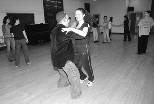How will product developers conjure up the household goods of the 21st century? According to Ely Dahan (SB 1978), assistant professor of marketing at the Sloan School, the Internet is revolutionizing how engineers and marketers determine what consumers want.
Dr. Dahan presented his ideas on January 6 as part of the ongoing IAP series, "Spark Forum: Rediscover the Wonder and Curiosity That Led You to MIT." The Spark Forum will "expose members of the MIT community to interdisciplinary research by junior faculty on campus," said David Mindell, the Dibner Assistant Professor of the History of Manufacturing and Technology and one of the organizers of the series, which is sponsored by the Office of the Dean for Students and Undergraduate Education.
Dr. Dahan's talk, "Using the Internet to Get Close to Customers and Design Insanely Great Products," showed how the Internet is beginning to allow marketers to test product prototypes with potential consumers via web diagrams and simulations. His research shows that web pictures and animations are more powerful predictors of consumer demand than physical prototypes or verbal descriptions.
By creating a cheap, effective way to test new products before they hit the market, the Internet has begun to streamline the research and development process, he said. As more powerful computer technology allows more complex web simulations, showing a consumer how a product might work will become increasingly easy.
Another catalyst in the field will likely be the development of videoconferencing, which will allow engineers to talk "face to face" with potential consumers.
Dr. Dahan agreed with an audience questioner that marketing on the Internet could disclose trade secrets to rivals. But he maintained that the promise of increased efficiency and drastically lower marketing costs are well worth the loss of some designs to other companies.
The Internet is already playing a big role, according to Dr. Dahan, by facilitating market segmentation. By tracing what Internet sites consumers choose to visit, companies can gather information about a consumer's preferences and can market appropriate products and services. The federal government, he noted, is considering Internet privacy legislation that would prohibit the gathering of such information.
Dr. Dahan said a relatively new area of marketing which has come from the growth of the Internet is mass customization, the specification of a modular product (such as a computer or furniture set) to a customer's preferences. Dell Computer Co., for example, has slashed the cost of computers languishing in warehouses by selling custom-built computers via the Internet.
Laptop computers embedded in your wristwatch? Cell phones attached to eyeglass frames? Increasingly, engineers, designers and marketers are using the Internet to test the waters for the boldest new ideas.
For more information, see the Spark series web page or contact Van Chu at x8-0691 or deepblue@mit.edu.
MLK panel hosts sessions on social change
The Martin Luther King Jr. Committee will present three IAP sessions entitled "Carrying on the Dream of Martin Luther King Jr: Exploring the Past and Changing the Future." They will examine the accomplishments and struggles of some of the individuals who are working for positive change in their communities.
Attendees at the informal presentations and discussions will have a chance to connect with the speakers and find out what can be done to make the world (or MIT) a better place. All sessions will run from 6-7:30pm and are free and open to the public. Dinner will be provided.
The sessions are as follows:
Paula Hammond, MIT assistant professor of chemical engineering -- "How Do You Carry on the Dream and Live Out the Legacy as an African-American Woman Engineer?" Tuesday, Jan. 18, BSU Lounge (Rm 50-105).
Bishop Barbara Harris, Episcopal Diocese of Massachusetts -- "Exploring the Connections Among Religion, Activism and Democracy." Wednesday, Jan. 19, Building W11 dining room.
Dr. Janet Moses, MIT Medical Department, Algebra Project -- "Strategies for Change: What You Can Do to Change the World." Thursday, Jan. 20, BSU Lounge (Rm 50-105).
A version of this article appeared in MIT Tech Talk on January 12, 2000.






